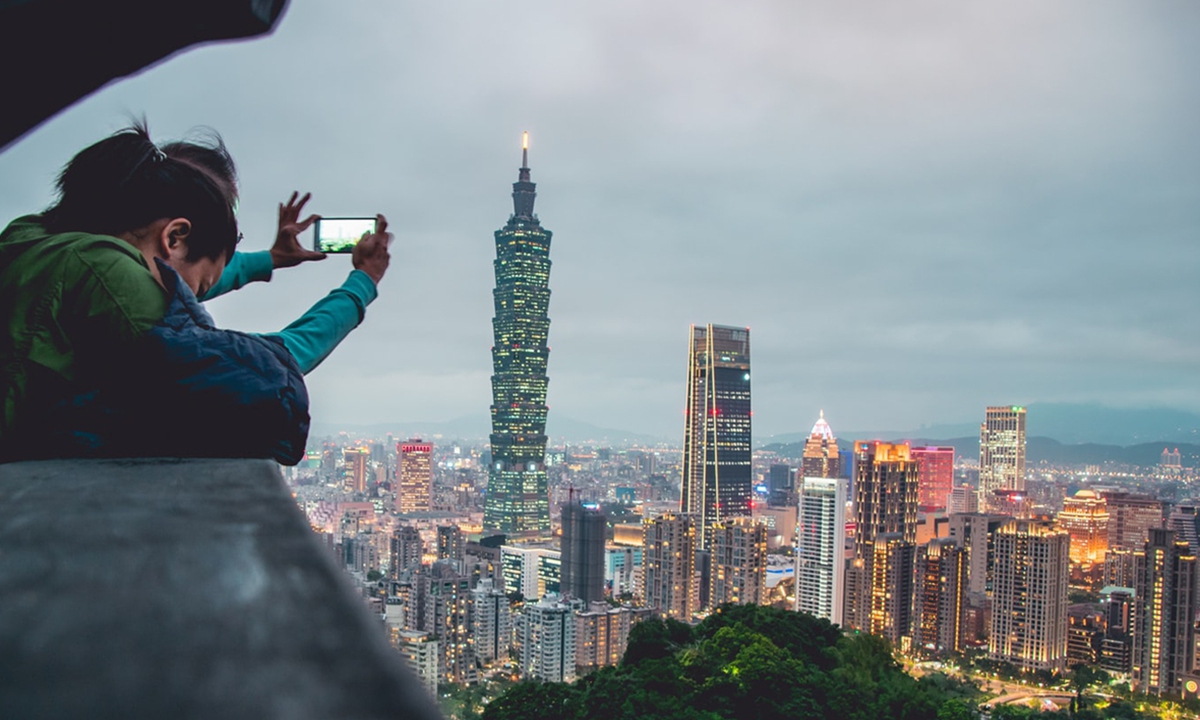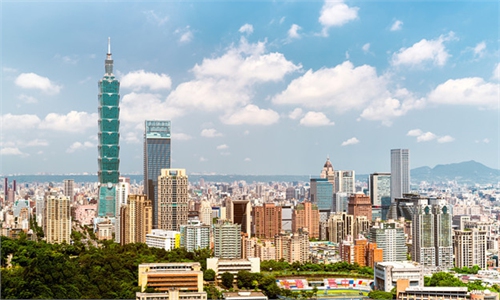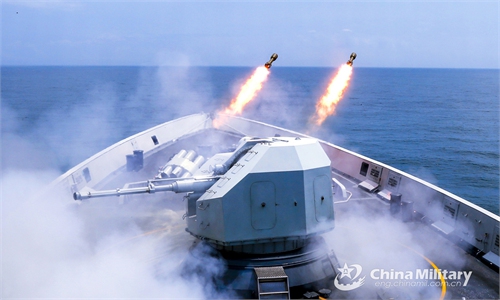Chinese mainland to blacklist Taiwan secessionists; ‘Tsai Ing-wen could be listed’
Deterrence to criminals, preparation for reunification: experts

PLA vessels in the Taiwan Straits, July 20, 2017. /CGTN Photo
Chinese mainland authorities in charge of Taiwan affairs will blacklist a group of "stubborn Taiwan secessionists," the Hong Kong-based newspaper Ta Kung Pao reported on Sunday, citing "authoritative sources."
Experts on Taiwan affairs said that the move will effectively deter secessionists and it would be a signal that the mainland is speeding up its preparation for reunification. They added that the leaders and core members of the Taiwan separatist authority, such as the regional leader of the island Tsai Ing-wen, who is also chairman of the Democratic Progressive Party (DPP), are very likely to be listed.
In order to crack down on rampant and aggressive Taiwan secessionist activities in and outside the island of Taiwan, mainland authorities in charge of Taiwan affairs are formulating a blacklist of Taiwan secessionist activists, said Ta Kung Pao.
Mainland authorities will take effective measures according to the blacklist and based on relevant laws, including severe sanctions, against "stubborn secessionists" who are involved in making separatist statements and who have committed egregious acts in pursuit of secessionism, as well as their major supporters and sponsors, the report said.
The sanctions or law enforcement include bringing them to justice in accordance with the Anti-Secession Law and the provisions of the Criminal Law and the National Security Law relating to the crime of secession, and authorities will chase them for the rest of their lives to hold them accountable, Ta Kung Pao reported Sunday.
A Beijing-based authoritative expert on Taiwan affairs who is familiar with the matter but asked for anonymity told the Global Times on Sunday that "mainland authorities are sending a signal to not only the island [of Taiwan] but the whole country and the entire world that the Chinese mainland is seriously preparing for the reunification of the island by all means."
"Those Taiwan secessionists who conducted rampant and even high-profile activities to damage cross-Straits ties and ganged up with foreign forces to pursue Taiwan secessionism should know that they, sooner or later, will be judged and punished," he said.
In response to the frequent provocations by Taiwan secessionist forces, mainland authorities have been mulling different types of disciplinary measures and will utilize the appropriate tools to deal a head-on blow to the secessionist forces, the Ta Kung Pao said.
Who is on?
Currently, the Taiwan Affairs Office of the State Council is yet to respond. Mainland experts said releasing the message to the media might be a signal of trying to impose an intangible deterrence, so the mainland authorities can observe the reactions from Taiwan politicians and secessionists to see if there is anyone can forsake the wrong idea or at least be more restrained.
When the blacklist is finalized and goes public, that would be an extremely serious move and the blacklisted persons would find it almost impossible to get pardoned, said the above-mentioned expert.
"The list would be the latest stern warning to the [Taiwan] secessionists, showing the mainland's firm stance - zero tolerance for Taiwan secessionism," Li Fei, a professor with the Taiwan Research Institute at Xiamen University, told the Global Times on Sunday.
"It will not be a particularly long list at first, but some infamous secessionist activists and core members or leaders of secessionist parties and NGOs are very likely to be listed, including the regional leader of the island Tsai Ing-wen," Li said.
Li also noted it would be an indirect warning to the Trump administration not to engage the island of Taiwan in his "final madness."
Although the mainland, at present, is unable to conduct law enforcement within the island, Chinese mainland experts noted that when the blacklist is issued, it can impose full deterrence to the secessionists and their sponsors.
Yang Lixian, deputy secretary general of the National Society of Taiwan Studies, told the Global Times on Sunday, "Some Taiwan secessionists have 'two faces' to deal with the two sides of the Taiwan Straits. On one hand, they are lying to mainland people and authorities to get sympathy and earn a lot of money from the mainland; on the other hand, after they return to the island, they return to secessionism and stigmatize the mainland."
With a clear blacklist, the kind of people with "two faces" will be totally banned and their businesses, deposits and investments in the mainland will be impacted, Yang said, adding that their activities overseas will also be affected, as they will be boycotted by the circles of overseas Chinese worldwide.
"We have about 30 million compatriots worldwide and the reunification of the motherland is also the common goal for Chinese worldwide, so these secessionists' opportunities for overseas business and investments will be seriously affected," Yang noted.
The anonymous expert said that "before reunification, the personal freedom of these blacklisted separatists, as well as their family members, will be largely restrained. Just like suspects wanted by the police, they will be scared and won't dare to travel to the mainland, Hong Kong or Macao, as well as other countries, especially countries which signed an extradition treaty with and have close relations with the People's Republic of China."
"Maybe they can still travel to the US and Western countries, or escape to these countries for the rest of their lives, but the risk will always remain. After reunification, if they remain on the island, they will be prosecuted, judged and punished," said the expert.

Taiwan Photo: Unsplash
Voices from Taiwan
The signal released by the Hong Kong newspaper got a lot of attention in Taiwan, and some politicians and experts from the island said that this is an unprecedented measure taken by the mainland. They consider that based on actions secessionists have taken in the past few years, they deserve to be blacklisted. These experts also suggested that mainland sanctions the secessionists as precisely as possible and not harm the innocent.
Yok Mu-ming, honorary chairman of the New Party, a pro-reunification political party on the island, told the Global Times on Sunday that "stubborn secessionists" mentioned in Ta Kung Pao's report could be regarded the "chief criminals who have obvious secessionist ideas, actions and remarks, so this kind of people should be blacklisted first."
"Second, those low-profile secessionists who are vague on their stances but provide concrete supports to the secessionists should also be blacklisted with solid evidence," Yok noted.
"In the past, I have suggested that mainland authorities list the 'chief criminals' among the Taiwan secessionists to impose a warning on them. I also suggested that pro-reunification forces within the island organize a vote to let the people of Taiwan decide who the chief criminals of Taiwan secessionists are," Yok noted.
Chang Ya-chung, a Taipei-based political scientist and a member of the KMT, the opposition party in the island, told the Global Times on Sunday that "based on what I learned, this is a new tactic made by the mainland, before an all-out military and economic confrontation, to precisely strike the specific individuals rather than the majority of Taiwan people."
Tang Xiang-long, a Taiwan-based TV commentator and an expert on cross-Straits relations, said that "recently, the Trump administration is still playing the Taiwan card to provoke the Chinese mainland, as [US] Secretary of State Mike Pompeo even openly said 'Taiwan has not been a part of China.' This kind of encouragement from a US administration toward Taiwan secessionism is unprecedented."
"So if Beijing does nothing in response, the atmosphere created by Pompeo will grow. To release the message of formulating a blacklist is a countermeasure from the mainland against the anti-China acts of the Trump administration," he said.
Taiwan-based analysts also said that with the intense and worsening cross-Straits relations, the separatist DPP is even more determined to be a pawn for the US to contain China, so the mainland has already lost faith in them to make any change.
"To these DPP members and secessionists, the mainland authorities want to say 'I am warning you. Behave yourself. I can read your every move and hear your every word. Maybe now I can't touch you, but I will give you a tag.' This will surely affect and deter those secessionists," Tang noted.




